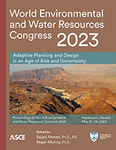Informing Efficient Landscape Watering through Weekly Neighborhood Watering Recommendations in College Station, Texas
Publication: World Environmental and Water Resources Congress 2023
ABSTRACT
Urban water utilities are increasingly grappling with the threat of drinking water scarcity amid intensifying extreme weather events and continued population growth. Despite decades of success in improving residential indoor water-use efficiency through low-flow water fixtures and appliances, outdoor water use may still represent up to 65% of total residential water use in many cities throughout the western United States and Texas. Up to half of water used outdoors is wasted because of inefficient sprinkler systems and overwatering. As cities in arid and semi-arid regions have sought to curtail outdoor water use amid multidecadal drought, many in humid climates have engaged with consumers to water their landscapes efficiently. Since 2015, the city of College Station, Texas, has implemented BVWaterSmart, a campaign for water conservation providing free weekly lawn watering recommendations to residents who subscribe. A network of eight rain gauges enables these recommendations to be furnished to households at the neighborhood level, capturing significant differences in irrigation requirements. Here, we examine the impact of this targeted behavioral intervention on outdoor water-use efficiency for nearly 300 single-family households using monthly water billing data and landscape water needs estimated using daily precipitation and evapotranspiration. Preliminary results suggest that irrigation efficiency improved for up to two years post-intervention, marked by a reduction in irrigation relative to the water budget and decreases in over-irrigation volume and frequency. Lessons gleaned from this study can help water utilities elsewhere implement a similar behavioral intervention program to promote water conservation through efficient use.
Get full access to this chapter
View all available purchase options and get full access to this chapter.
REFERENCES
Bergquist, M., Nilsson, A., and Schultz, W. P. (2019). A meta-analysis of field-experiments using social norms to promote pro-environmental behaviors. Global Environmental Change, 59, 101941.
Boyer, M. J., Dukes, M. D., Young, L. J., and Wang, C. (2016). Mining for Water: Using Billing Data to Characterize Residential Irrigation Demand. Journal AWWA, 108(11), E585–E597.
Bremer, D. J., Keeley, S. J., Jager, A., Fry, J. D., and Lavis, C. (2012). In-ground irrigation systems affect lawn-watering behaviors of residential homeowners. HortTechnology, 22(5), 651–658.
Chong, W., and Stevens, A. (2016). Evolution of the 2010-2015 Texas Drought. Retrieved from https://noaa.maps.arcgis.com/apps/MapJournal/index.html?appid=dffc0cc0063f44c7a2ad2f572726dd09.
Combs, S. (2012). The Impact of the 2011 Drought and Beyond. Texas Comptroller of Public Accounts.
Ehret, P. J., Hodges, H. E., Kuehl, C., Brick, C., Mueller, S., and Anderson, S. E. (2019). Systematic Review of Household Water Conservation Interventions Using the Information–Motivation–Behavioral Skills Model. Environment & Behavior. doi:https://doi.org/10.1177/0013916519896868.
Endter-Wada, J., Kurtzman, J., Keenan, S. P., Kjelgren, R. K., and Neale, C. M. U. (2008). Situational Waste in Landscape Watering: Residential and Business Water Use in an Urban Utah Community. Journal of the American Water Resources Association, 44(4), 902–920. doi:doi:https://doi.org/10.1111/j.1752-1688.2008.00190.x.
Fielding, K. S., Spinks, A., Russell, S., McCrea, R., Stewart, R., and Gardner, J. (2013). An experimental test of voluntary strategies to promote urban water demand management. Journal of Environmental Management, 114(0), 343–351. doi:https://doi.org/10.1016/j.jenvman.2012.10.027.
Finley, S. L., and Basu, N. B. (2020). Curbing the Summer Surge: Permanent Outdoor Water Use Restrictions in Humid and Semiarid Cities. Water Resources Research, 56(8), e2019WR026466. doi:https://doi.org/10.1029/2019WR026466.
Flack, J. E., and Greenberg, J. (1987). Public Attitudes Toward Water Conservation. Journal AWWA, 79(3), 46–51. Retrieved from www.jstor.org/stable/41290842.
Gober, P., Quay, R., and Larson, K. L. (2016). Outdoor Water Use as an Adaptation Problem: Insights from North American Cities. Water Resources Management, 30(3), 899–912. doi:https://doi.org/10.1007/s11269-015-1205-6.
Gopal, N. R., Gopal, K., Khedun, C. P., Lewis, A. C., and Kaiser, R. A. (2022). BVWaterSmart: An App for Water Conservation in Brazos Valley, Texas. Paper presented at the World Environmental and Water Resources Congress 2022.
Harlan, S. L., Yabiku, S. T., Larsen, L., and Brazel, A. J. (2009). Household Water Consumption in an Arid City: Affluence, Affordance, and Attitudes. Society & Natural Resources, 22(8), 691–709. doi:Doi https://doi.org/10.1080/08941920802064679.
Khedun, C. P., Lewis, A. C., and Kaiser, R. A. (2018). Mining Water Billing Data to Explore Outdoor Water Use during Different Weather Conditions. Paper presented at the World Environmental and Water Resources Congress, Minneapolis, MN.
Lewis, A. C., Khedun, C. P., and Kaiser, R. A. (2017). Coefficients for Estimating Landscape Area on Single-Family Residential Lots. Journal AWWA, 109(8).
Lewis, A. C., Khedun, C. P., and Kaiser, R. A. (2022). Assessing Residential Outdoor Water Conservation Potential Using Landscape Water Budgets. Journal of Water Resources Planning and Management, 148(6), 04022023. doi:doi:https://doi.org/10.1061/(ASCE)WR.1943-5452.0001547.
Mayer, P. W., DeOreo, W. B., Optiz, E. M., Kiefer, J. C., Davis, W. Y., Dziegielewski, B., and Nelson, J. O. (1999). Residential End Uses of Water: American Water Works Association.
Stern, P. C. (2000). New environmental theories: toward a coherent theory of environmentally significant behavior. Journal of social issues, 56(3), 407–424.
US Census Bureau. (2020). Most of the Counties with the Largest Population Gains Since 2010 are in Texas [Press release]. Retrieved from https://www.census.gov/newsroom/press-releases/2020/pop-estimates-county-metro.html.
Warner, L. A., Diaz, J. M., and Dukes, M. D. (2022). Selecting High-Impact Landscape Irrigation Conservation Behaviors: Formative Research to Inform Behavior-Change Efforts. Social Marketing Quarterly, 28(1), 28–43. doi:https://doi.org/10.1177/15245004211071057.
Information & Authors
Information
Published In
History
Published online: May 18, 2023
ASCE Technical Topics:
Authors
Metrics & Citations
Metrics
Citations
Download citation
If you have the appropriate software installed, you can download article citation data to the citation manager of your choice. Simply select your manager software from the list below and click Download.
